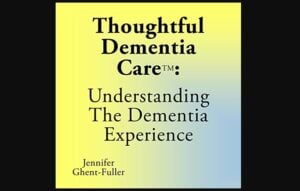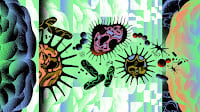A key study offers an easy-to-do care tip. Research suggests that light treatment, tailored to increase circadian stimulation during the day, may improve sleep, depression and agitation in people with Alzheimer’s and related dementia.
Light is Simple, Inexpensive, Non-pharmacological
Results show that exposure to the tailored light treatment during daytime hours for four weeks significantly increased sleep quality, efficiency and total sleep duration. It also significantly reduced scores for depression and agitation. (Article continued below video…)
Boosting Daytime Light Levels
“It is a simple, inexpensive, non-pharmacological treatment to improve sleep and behavior in Alzheimer’s disease and dementia patients,” said principal investigator Mariana Figueiro, PhD, associate professor and Light and Health program director of the Lighting Research Center at Rensselaer Polytechnic Institute in Troy, New York. “The improvements we saw in agitation and depression were very impressive.”
Therapy lights are easy to find at places such as:
- Your local lighting store
- Home Depot
- Amazon.com offers a variety of bright therapy lights
There are many ways to boost light levels during waking hours in order to correct changes in the circadian rhythm of people with Alzheimer’s. The following video illustrates state-of-the-art LED lighting for the home. A discussion of the Alzheimer’s / Sleep / Lighting study continues below the video.
Dr. Figueiro’s research abstract was published in an online supplement of the journal Sleep and was presented in Minneapolis, Minnesota, at the 28th annual meeting of the Associated Professional Sleep Societies LLC.
Light Exposure During the Day
The pilot study involved 14 nursing home patients with Alzheimer’s disease and related dementia. A light source producing low levels of 300 to 400 lux of a bluish-white light with a color temperature of more than 9000 K was installed in the residents’ rooms. Light exposure occurred during daytime hours for a period of four weeks. Light-dark and activity-rest patterns were collected using a calibrated instrument prior to and after the lighting intervention. Measures of sleep quality, depression and agitation also were collected using standardized questionnaires.
Figueiro added that the improvement in sleep quality also was associated with other noticeable behavioral changes.
“Subjective reports by the nursing staff were that the patients were calmer, eating better and their overall behavior was more manageable,” she said.
Second Sleep & Lighting Study
A second “Tailored Lighting Intervention for Alzheimer’s and Sleep” study confirmed these results. While all measures improved, the most significant improvement was seen in sleep quality.
“Here we show that if the stimulus (light dose) is carefully delivered and measured, it can have a strong impact on sleep, depression and agitation,” said Dr. Figueiro. “Depression was a secondary measure, and I was pleasantly surprised by the positive impact of the light treatment on depression scores.”
The study involved 43 subjects diagnosed with Alzheimer’s disease and related dementias who were exposed to an active and inactive tailored lighting intervention for successive 4-week periods, spaced by a 4-week washout period. The lighting intervention was added to spaces in which patients spent most of their waking hours and was energized from wake time until 6 p.m. Calibrated personal light meters monitored exposures. Measures of sleep disturbances (Pittsburgh Sleep Quality Index), mood (Cornell Scale for Depression in Dementia) and agitation (Cohen-Mansfield Agitation Index) were collected at baseline and during the last week of the intervention.













please could you provide a copy link function for your articles (for sharing)
Light can be used therapeutically to reverse dementia. Please see our published study on the subject.
https://www.quietmindfdn.org/store/p13/cognitolite.html
I'd like to say that artificial lighting is always a bit demotivating for me. I like to plan my home in a way so that most of natural lighting could get into home area.
Some of the full spectrum lights now include LED's that are low energy consuming, and should feel less "artificial."
Depending on where you live, natural lighting may be difficult, so, if light is important and natural light hard to come by, this could still be a good option, at least for some!
Light in our home and workplace can affect our health and wellbeing. Natural light has many benefits
This is an important message about light having the capacity to help improve dementia symptoms. Our clinical trials and work with patients for the last 12 years has shown that light stimulation can reverse dementia symptoms including memory loss, fatigue, agitation, depression, sleep quality, gait stability and continence. We are currently conducting clinical trials in Texas and Pennsylvania using these home-based, easy to use, light therapy device.
See https://clinicaltrials.gov/ct2/show/NCT03750409
for details and informed consent documents or call 610-940-0488 Quietmind Foundation.
http://www.google.com/patents/US6630507